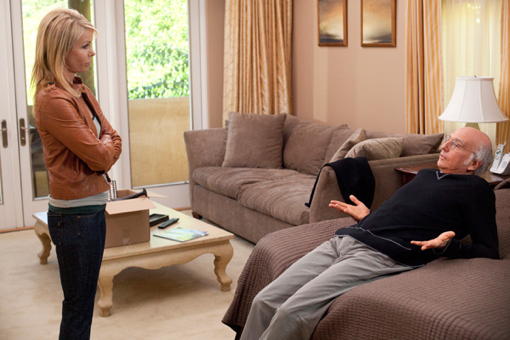By Zack Gutin · July 18, 2011

In the documentary Comedian, which features Jerry Seinfeld post-sitcom life, attempting to build a new stand-up act from scratch, Seinfeld’s opening act is a growing comedian named Orny Adams. The younger comic proclaims at one point, “lightning has to strike twice for you to become a legend in this business.” As Seinfeld co-creator Larry David brings his painfully neurotic, observatory style humor into an eighth season of his second series, Curb Your Enthusiasm, it is apparent that the writer-turned-actor may have been able to drum up that ever-elusive second lighting bolt. Funny as ever, Larry is back.
In the eighth season premiere, we are immersed in Larry’s pending divorce from his gorgeous wife, played by Cheryl Hines. The episode actually starts with the breaking point of the relationship, after season 7 left it very much teetering. In the opening scene, the two are actually spending time together – trying to mend the broken pieces – but Larry can’t help but call Cheryl out for leaving a moisture ring from her iced coffee on his wooden coffee table. “You don’t respect wood, do you?” asks David, which reminds him of a previous situation in their relationship – brilliantly extracted from a previous storyline – in which he was blamed for a moisture ring on Julia Louis Dryfus’s table. In hopes to clear his own name, he starts to dial Julia to let her know he was innocent after-all, effectively letting his neurosis drive Cheryl out the front door – for good.
While Curb maintains a largely improvised writing style, the structure of a great TV show is largely intact and evident by the scene described above. Effectively, by setting the divorce in motion, we begin a new chapter in Larry’s life. Like any good season-starter, you must introduce a new set of problems, a road your character has yet to travel down. By outlining and carefully constructing “plot posts” for each episode to touch on, it matters less what is said in each actual line of dialogue, more that the cast is steering towards those milestone pieces of information. Much like a long-form improvisational performance that you might see at comedy theaters like Upright Citizens Brigade or Groundlings, the cast knows the points they want to reach, even if the premise seems completely made up on the spot. But, of course, little is left to chance – even if the words are made up on the fly.
Different in a TV show, than a live performance, is the post-production process. Those lines of dialogue must still work to create a cohesive story, so that your editors can put it all together, which is where David’s brilliance truly lies. The outlining process must be painstaking, in that he and his staff are so carefully creating those plot points to allow for improvisation, which gives the show its truly natural, conversational feel. It’s a sign of mastery of the craft. As legendary UCLA screenwriting professor Hal Ackerman explains in his book, “Writing Screenplays That Sell,” building effective scene sequences is like playing dominoes; if your scenes run into each other too abruptly, you risk the dominoes collapsing to one side or another and missing the one in front of it. Instead, those scenes must land precisely in the right position to knock the story forward, even as it weaves and turns in different directions. Imagine, then, the challenge of making dominoes fall correctly, if you don’t know where each is positioned.
As the episode proceeds, we meet the lawyers for both sides of the divorce, which lends itself to a hilarious cameo appearance by the hysterical Paul F. Tompkins. When David finds out that, despite appearing to be Jewish, that his lawyer is not Jewish – David fires him. He also recommends that his friend and Dodger owner make the same decision. After an incident in which a restaurant manager threatens to charge for two buffet servings when David tries to share some of his lunch, a nearby patron comes to their rescue with well-practiced legal jargon. David hires him to handle the divorce and, again, recommends the same to his Dodger-owner friend. Ultimately, the recommendation costs David his house in his divorce and costs his friend the entire Dodger organization.
Art imitating life is the recipe for success in Larry David’s Curb Your Enthusiasm. Similar to Seinfeld, the show that doesn’t rely on any given set of circumstance – but rather – the many circumstances life can throw at you, he has been able to draw enough juice to bring two series into the eight-season marker. Seinfeld went a ninth season, but only at the aggressive push of NBC, and ultimately to the chagrin of many fans. Will HBO fight for the same from Curb? Doubtful. HBO will let David decide what to do at the end of this season, but for now, we’ve got a full season of David stepping into single man territory, post-divorce. I can’t wait for the rest of the season.